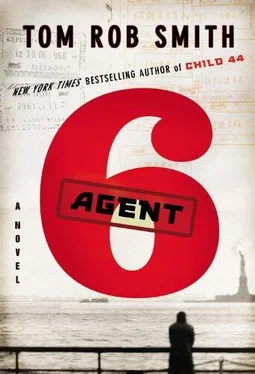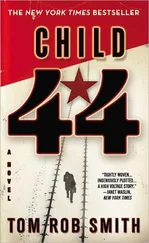Tom Smith - Agent 6
Здесь есть возможность читать онлайн «Tom Smith - Agent 6» весь текст электронной книги совершенно бесплатно (целиком полную версию без сокращений). В некоторых случаях можно слушать аудио, скачать через торрент в формате fb2 и присутствует краткое содержание. Жанр: Триллер, на английском языке. Описание произведения, (предисловие) а так же отзывы посетителей доступны на портале библиотеки ЛибКат.
- Название:Agent 6
- Автор:
- Жанр:
- Год:неизвестен
- ISBN:нет данных
- Рейтинг книги:4 / 5. Голосов: 1
-
Избранное:Добавить в избранное
- Отзывы:
-
Ваша оценка:
- 80
- 1
- 2
- 3
- 4
- 5
Agent 6: краткое содержание, описание и аннотация
Предлагаем к чтению аннотацию, описание, краткое содержание или предисловие (зависит от того, что написал сам автор книги «Agent 6»). Если вы не нашли необходимую информацию о книге — напишите в комментариях, мы постараемся отыскать её.
Agent 6 — читать онлайн бесплатно полную книгу (весь текст) целиком
Ниже представлен текст книги, разбитый по страницам. Система сохранения места последней прочитанной страницы, позволяет с удобством читать онлайн бесплатно книгу «Agent 6», без необходимости каждый раз заново искать на чём Вы остановились. Поставьте закладку, и сможете в любой момент перейти на страницу, на которой закончили чтение.
Интервал:
Закладка:
Zabi was startled by a voice.
– You there!
She turned around, fearful that she was about to be scolded. An older boy was walking among the apricot trees. In the bright sunshine Zabi couldn’t make out his features. He asked:
– Why do you look so sad?
Zabi raised a hand, blocking the sun and focusing on the boy’s face. It was Sayed Mohammad. Sayed was a teenager, fourteen years old and not at all like his older brothers, who were rarely in the village. Shyly, Zabi stumbled a reply:
– I’m not sad.
– Liar! I can see you are.
Zabi didn’t answer, intimidated by this young man. He was known in their village for his singing and poetry. Despite his youth, he would often sit and talk with adult men, sipping their bitter tea as though he was one of them. She asked, changing the subject:
– What have you been doing?
– I’ve been composing a poem.
– You can do that while walking?
Sayed smiled.
– I compose them in my head.
– You must have a good memory.
He seemed to think about this assertion seriously. Sayed thought about most things seriously.
– I have a technique for remembering poems. I sing them to other people. The ones that aren’t very good I quickly forget. Don’t you forget the things you don’t do very well?
Trying to imitate his thoughtfulness, Zabi nodded, slowly. Before she could reply, he noticed her fingers.
– Why are your fingers red?
– I’ve been making dye.
Zabi wanted to impress Sayed and blurted out:
– Did you know that the colour red tastes bitter?
To her surprise, he was interested.
– Is that so?
– I spent all morning making the dye. I tasted it several times.
– What is it made from?
– Pomegranate rinds.
Zabi was pleased that she hadn’t said something stupid. Sayed scratched his facp›
– Red has a bitter taste… I could use that idea in a poem.
Zabi was amazed.
– You could?
– The Soviet Union’s flag is red, so saying red has a bitter taste is a political statement.
He glanced at Zabi’s expression:
– Do you know what the Soviet Union is?
– They’re the invaders.
He nodded, pleased.
– The invaders! That can be the name of my poem. The first line could say something along the lines of…
He trailed off again, closing his eyes, deep in concentration, trying various ideas.
– Red flag as bitter as?
Zabi suggested:
– Pomegranate rinds?
Sayed laughed.
– Doesn’t that sound kind to our enemy? To suggest their ideology tastes like our national fruit? We can’t compare a fruit that grows here, in the soil of Afghanistan, to the flag of the invaders.
With that proclamation, Sayed walked off, apparently forgetting about Zabi. Wanting to hear more, and not wanting the conversation to end on her stupid suggestion, she caught up with him.
– Can you sing me a poem?
– I don’t sing my poems to little girls. I have a reputation to think of. I sing only to warriors.
Hurt, Zabi stopped walking. Sayed noticed her reaction.
– Don’t take it so badly.
Zabi wanted to cry. She hated being a girl. He softened his tone, saying:
– Did you know that my father used to despise my poems? He would hit me and tell me to shut up. He said singing and poetry were for women, he told me to be more like my brothers. It is true, some poetry is for women, such as lullabies, or a nakhta, sung by women when they mourn the death of a hero. The nakhta made me think perhaps I should compose lyrics for heroes, not mournful, but triumphant, when they are victorious against the invaders. Poetry must be more than pretty and pleasant on the ear. It must have purpose. It must have anger.
Sayed picked at the leaves of the trees, continuing:
– I sang these new poems to my father. They changed his mind. He no longer hit me. He began to tell me more and more about events in our country so that my poems would be more accurate. Since that change I sing poems about the resistance, poems that are protests against the treatment of our Afghan brothers and sisters. My father is proud of me. He brings fighters in from the hills. They tell their stories, which I turn into poems. I am compiling a poetic history of our war, thousands of different poems. My father is going to take me travelling, through the hills, performing at different camps. Did you know that my brothers are warriors?
– I didn’t know that.
– They’re fighting the Soviets. Samir told me he was going to blow up a dam and bring water crashing down, sweeping away the Soviet tanks. They’ll come back to the village soon and I’ll turn their victories into the best poems I’ve ever composed. The whole village will gather round and listen.
Sayed crouched down beside Zabi, whispering as though there were people in the orchard with them who might overhear:
– Do you want to hear a poem that would have you arrested and shot dead if you sang it in the streets of Kabul? If I sing it for you, you mustn’t tell anyone, and no one can ever know. Promise to keep it a secret?
Zabi was nervous and excited, and not wanting to seem afraid, she nodded.
– I promise.
Sayed began to sing:
– O Kamal!
He stopped.
– Do you know who Kamal is?
Zabi shook her head. She didn’t know anyone called Kamal.
– Kamal is the President. Do you know what a president is?
– An elder?
– In a way, yes, he’s a ruler, a leader, but he was not chosen by us, by the people who live in this country, he was put in power by the invaders to do their bidding. Imagine if our village elder was chosen by another village located thousands of miles away. Would that make any sense? And then imagine if that elder hadn’t even been born in our village, but came from outside, came here, to our land and told us what we could and couldn’t do.
Zabi understood: such a system didn’t make any sense.
Sayed picked up his song:
– O Kamal! Son of Lenin…
He paused again.
– Do you know who Lenin is?
Zabi shook her head. The name was odd to her ear.
– Lenin is the man who created Communism, which is the name of the religion that the invaders believe in. Lenin is a god to the invaders, or a prophet, a divine figure – they hang up photographs of him in their schools and buildings. They read his words and chant them.
Sayed began his song again. O Kamal! Son of Lenin,
You do not care for the religion and the faith
You may face your doom and
May you receive a calamity, O son of a traitor,
O son of Lenin!
Zabi didn’t fully grasp the meaning of the lyrics despite the explanation. However, she loved the sound of Sayed’s voice and at the end she clapped.
Smiling, Sayed was about to take a small bow when, like a startled animal, he spun around, staring up into the sky. Zabi couldn’t hear anything except the rush of the water in the irrigation channel. Sayed didn’t move: eyes fixed on the empty blue sky. Belatedly Zabi heard the noise too, a noise unlike any other she’d heard before.
Sayed grabbed her by the waist, lifting her into the nearest tree. Zabi climbed up.
– What do you want me to do?
– Look into the sky! Tell me what you see!
Even though she was light, the tree wasn’t very old and the branches bent under her weight. The noise was growing louder. She could feel vibrations through the trunk. Unable to climb any further, she poked her head above the top of the tree.
– What do you see?
Coming directly towards her, flying low over the trees, were two war machines – giant steel insects with stub wings, each with spinning blades that cut through the air, blurring the blue sky above them. They had windows at the front, a bulb of glass – a terrifying huge monster eye. The flying machines were so low she could see the man seated inside, the pilot’s face hidden by a helmet. As they passed overhead, it felt possible to reach out and touch their steel bellies. Sayed was shouting to her but she couldn’t hear what he was saying, just the thump-thump of the spinning blades. A gust of air, a man-made storm passed through the trees. She gripped the branch tightly. The entire tree was shaking. Ignoring Sayed’s calls for her to come down, Zabi watched as the two giant steel insects circled her village.
Читать дальшеИнтервал:
Закладка:
Похожие книги на «Agent 6»
Представляем Вашему вниманию похожие книги на «Agent 6» списком для выбора. Мы отобрали схожую по названию и смыслу литературу в надежде предоставить читателям больше вариантов отыскать новые, интересные, ещё непрочитанные произведения.
Обсуждение, отзывы о книге «Agent 6» и просто собственные мнения читателей. Оставьте ваши комментарии, напишите, что Вы думаете о произведении, его смысле или главных героях. Укажите что конкретно понравилось, а что нет, и почему Вы так считаете.












